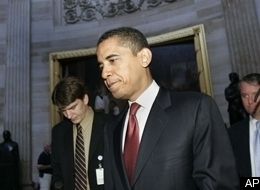
About Thomas B. Edsall
Thomas B. Edsall is the political editor of the Huffington Post. He is also Joseph Pulitzer II and Edith Pulitzer Moore Professor at the Columbia Graduate School of Journalism. From 1981 to 2006, he was a political reporter at the Washington Post. He is the author of Chain Reaction and Building Red America. Tom can be reached at edsall@huffingtonpost.com.Top officials of the Barack Obama campaign are privately exploring ways to help Hillary Clinton discharge her debts and pay back the $11.43 million she has loaned her organization, but they are running into two major stumbling blocks.
The first is obvious: the deep and growing animosity of Obama supporters towards Clinton, whom they see as raising issues of race and 'elitism' that will hurt the Illinois Senator in November.
In an interview with USA Today for example, Clinton declared: "I have a much broader base to build a winning coalition on," citing an AP article "that found how Sen. Obama's support among working, hard-working Americans, white Americans, is weakening again, and how whites in both states who had not completed college were supporting me."
The second is less obvious: Mark Penn.
For many Obama backers, Penn, the former chief strategist for Clinton and head of one of the biggest PR-lobbying conglomerates in the nation's capital, is the quintessential Washington insider, capitalizing on political connections to become a multi-millionaire.
The immediate problem with Penn -- whose conflicts of interest plagued the Clinton campaign and ultimately led to his being publicly, if not privately, repudiated -- is that if Obama helps Clinton pay off her debts, a big chunk of those debts -- an estimated $10 million or more -- is owed to Penn.
Penn is the CEO of Burson-Marsteller, which has "a global network of 94 offices and 1600 employees that brings world-class public relations to companies around the world."
Burson-Marsteller is one of the 246 companies owned by WPP, a leading global advertising and marketing services group. WPP controls a powerful array of public relations, advertising and lobbying companies, including Hill and Knowlton; Dewey Square; Ogilvy and Mather; Public Strategies Inc.; AGB Nielsen Media Research; Quinn Gillespie and Associates; Timmons and
Company; Wexler and Walker Public Policy Associates; Young and Rubicam Brands.
Penn, who remains a top adviser to Clinton, was forced to step down as the face of the Clinton strategy team after disclosures that he was meeting privately with the government of Colombia to promote congressional approval of a trade agreement which Clinton - and her most loyal voters -- oppose.
Consideration by the Obama camp of providing financial help to Clinton would be part of a peace-making process in the event that she withdraws from the presidential nominating contest.
Under federal campaign finance law, the Obama campaign cannot directly pay off Clinton's debts, or the $11.43 million she has loaned the campaign, because that would violate campaign contribution limits. But if Obama is the nominee, he and his donor base could provide invaluable help to her in raising money through signed appeals, joint fundraisers and by other
methods.
The Obama campaign does not want to be identified as having discussions about Clinton's finances. Obama aides used the term "chit-chat" to dismiss any such discussions.
Many of Obama's grassroots and netroots backers appear to be outraged at the thought that the Obama campaign might step in to lend a hand to get Clinton out of a financial hole -- and out of the race -- as was reported
Wednesday.
The Huff Post web site was flooded with more than 1,200 complaints on this score:
"No! No! No!" wrote a commenter using the web name 'Realbluesky'. "The Clintons have proven what kind of scum they are." 'Dbrockx' wrote: "Why is she being rewarded for disrupting the Democratic party and trying to sabotage Obama?" 'Amber09' pulled no punches: "The Clintons would never help Obama if this was reversed! They would be laughing they asses off that a
black man could dare to think he could beat the Clinton machine! The Clintons created the mud pond, let them now stay in the mud they created!"
Both Obama and Clinton have broken all Democratic fundraising records. Through the first quarter of this year, Obama raised $234.7 million, and Clinton $189.1 million. As of March 31, the date of the most recent FEC filing, Obama had $51.1 million in the bank and just $662,784 in debt, for a net cash position of $50.4 million; while Clinton had $31.7 million in the bank, debts of $15.2 million, and had loaned the campaign $6.4 million. (The FEC lists debts and loans separately.) More recently, Clinton disclosed that she had made her campaign additional loans, bringing the total amount she has loaned to her effort to $11.4 million. At the same time, her campaign was running close to broke for much of last month. Details of fundraising and
spending for the month of April do not have to be filed until May 15.
Money is a central issue in the delicate negotiations that many expect to lead to a Clinton withdrawal. A winning candidate often offers to do whatever is legal to help a loser pay down debts. In this case, there is exceptional animosity between the two camps. Furthermore, Penn's interest in any negotiations are sure to be pressed very aggressively by the Clinton campaign's new Chief Operating Officer, Howard Paster. Paster was brought in immediately upon Penn's retreat, and, as it happens, Paster is Penn's boss. Paster is the executive vice president for public relations and public affairs at Burson-Marsteller's parent company, WPP.
In his new capacity as COO of the Clinton campaign, Paster is almost certain to be central in deciding how much of any money Obama might help raise for Clinton is used to pay off the debt to Penn. This set of relationships will undoubtedly impact the enthusiasm of Obama donors for aClinton-Obama pact.
Original here



No comments:
Post a Comment